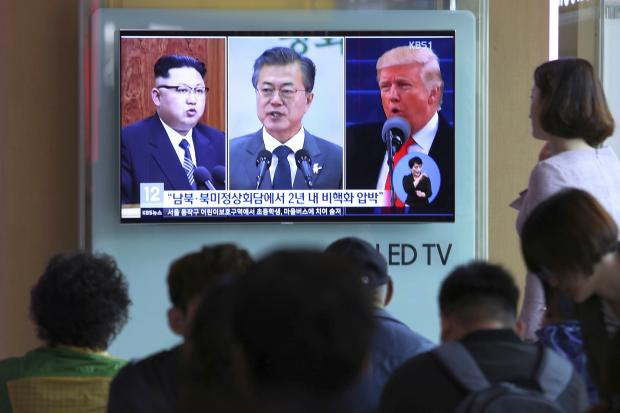Korean leaders can discuss peace, but can’t end war by themselves

People watch a TV screen showing file footage of US President Donald Trump (right), South Korean President Moon Jae-in and North Korean leader Kim Jong Un (left) during a news program at the Seoul Railway Station in Seoul, South Korea, Wednesday, April 18, 2018. The sign read: “Summit meeting between South and North Korea, the United States and North Korea .” (Photo by AHN YOUNG-JOON / AP)
SEOUL, South Korea — President Donald Trump has given his “blessing” for North and South Korea to discuss the end of the Korean War amid a diplomatic push to end the North Korean nuclear standoff. One problem: There can be no real talks without the involvement of the other countries that fought the 1950-53 war, and especially the United States.
The reason is that South Korea wasn’t a direct signatory to the armistice that stopped the fighting but left the Korean Peninsula still technically in a state of war.
There’s widespread interest in what South Korean President Moon Jae-in and North Korean leader Kim Jong Un plan will talk about during their summit on April 27, which would only be the third such meeting between the countries’ leaders. A separate meeting between Kim and Trump is anticipated in May or June.
Trump revealed Tuesday that the US and North Korea had been holding direct talks at “extremely high levels” in preparation for their summit. Trump also said that North and South Korea are negotiating an end to hostilities before next week’s summit.
“They do have my blessing to discuss the end of the war,” Trump said.
Article continues after this advertisementA senior South Korean presidential official said Wednesday that the Koreas plan to use their summit to discuss ending military hostilities, but it wasn’t clear if they’d discuss the end of the war.
Article continues after this advertisement“We don’t know yet whether a specific expression like ’end of the war’ will be used during the inter-Korean summit, but we do wish for an agreement at ending hostilities between the South and North,” said the official, who spoke on condition of anonymity, citing office rules.
North Korea has long sought a peace treaty with the United States to formally end the war.
Some South Koreans fear that the North could use such a treaty as a pretext for demanding the withdrawal of the 28,500 American troops currently stationed in the South.
Some worry that potential discussions to formally end the war may distract from already difficult efforts to rid the North of nuclear weapons and apply robust verification of that process.
The armistice was signed by the US-led United Nations Command, North Korea and China. South Korea was a member of the UN Command but was not a direct signatory.
In their previous summit in 2007, the Koreas declared a commitment toward ending the war and vowed to pursue discussions with others. But the efforts faltered and the relations between the rivals worsened after a conservative government took office in Seoul in February 2008.